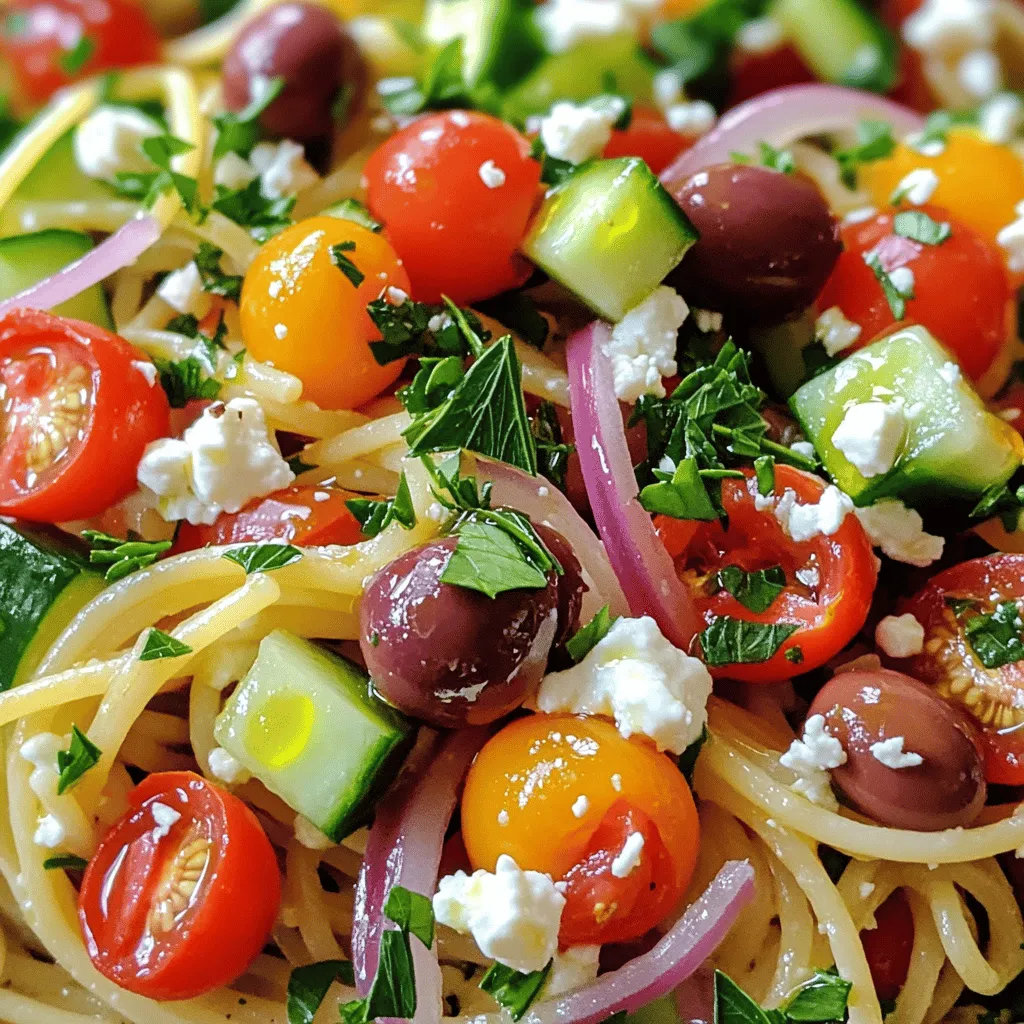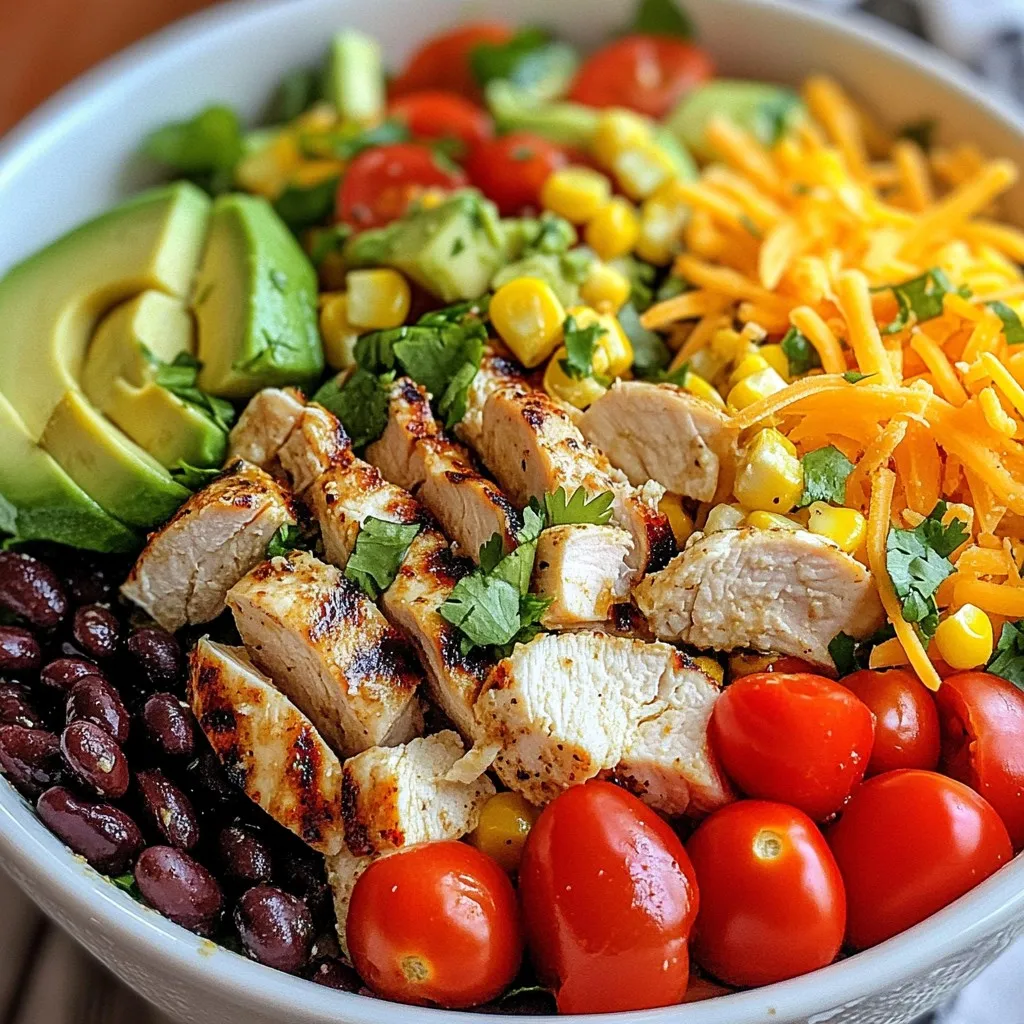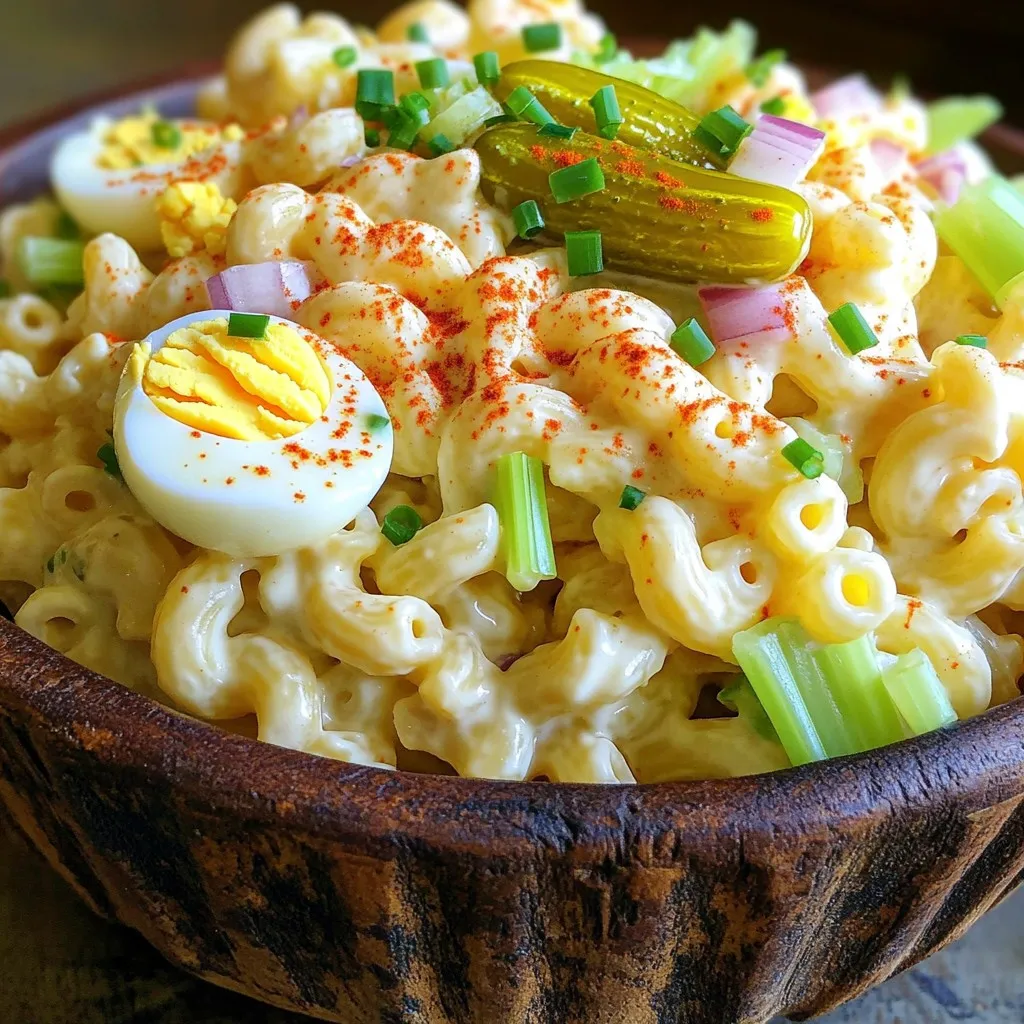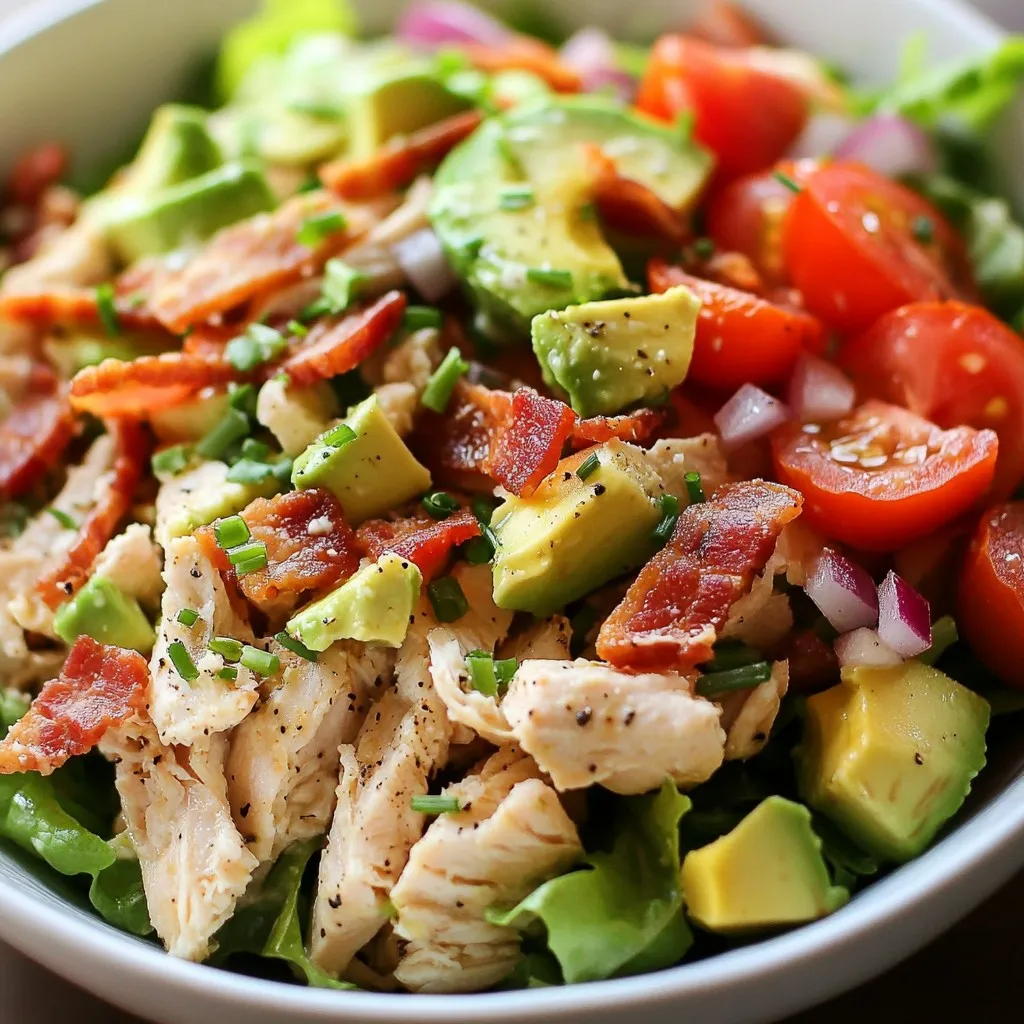Looking for a tasty and refreshing summer dish? Spaghetti salad is the answer! This vibrant dish combines tender spaghetti noodles with colorful vegetables, Kalamata olives, and feta cheese. It’s easy to make and perfect for picnics or backyard barbecues. In this guide, I’ll walk you through the ingredients, step-by-step instructions, and helpful tips to create a salad that dazzles. Ready to impress your friends and family? Let’s get started!
Ingredients
Main Ingredients for Spaghetti Salad
– Spaghetti noodles
– Fresh vegetables: cherry tomatoes, cucumber, and red onion
– Kalamata olives and feta cheese
The main ingredients create a colorful and tasty dish. The spaghetti noodles form the base, providing a hearty texture. I prefer using whole grain spaghetti for added fiber. Fresh vegetables like cherry tomatoes, cucumber, and red onion add crunch and flavor. The sweet tomatoes balance the crisp cucumber and sharp onion. Kalamata olives give a briny kick. Feta cheese adds a creamy, salty finish. These ingredients together make each bite satisfying.
Dressing Ingredients
– Olive oil and vinegar options
– Seasoning: oregano, salt, and pepper
The dressing is key to a great spaghetti salad. I like using high-quality olive oil for richness. Red wine vinegar brings a tangy note, but you can use apple cider vinegar for a sweeter taste. I mix in dried oregano, salt, and pepper to enhance the flavor. This simple dressing ties all the ingredients together, making every bite burst with taste.
Nutritional Information
– Breakdown of calories per serving
– Key nutrients from main ingredients
This salad is not just tasty; it’s good for you too. A serving has about 250 calories, making it a light meal. The spaghetti provides carbs for energy. Fresh vegetables are packed with vitamins and minerals. Olives add healthy fats. Feta cheese gives protein and calcium. Overall, this dish supports a balanced diet while being refreshing and delightful. For the full recipe, check out the Mediterranean Spaghetti Salad.
Step-by-Step Instructions
Cooking the Spaghetti
To cook spaghetti al dente, follow the package instructions. Bring a pot of salted water to a boil. Add the spaghetti and stir occasionally. Cook until the pasta is firm but tender. This usually takes about 8 to 10 minutes. Once cooked, drain the spaghetti in a colander. Rinse it under cold water. This stops the cooking process and cools the pasta quickly. Make sure to let it cool completely before mixing it into your salad.
Mixing the Ingredients
In a large bowl, add the cooled spaghetti. Now, it’s time to add some color and crunch. Toss in the halved cherry tomatoes, diced cucumber, and thinly sliced red onion. Mix these fresh veggies gently. Next, introduce the Kalamata olives. Add the crumbled or cubed feta cheese carefully. You want to fold it in gently, so it doesn’t break apart too much.
Preparing the Dressing
Grab a small bowl for the dressing. Whisk together the olive oil, red wine vinegar, and dried oregano. Use a fork or small whisk for a smooth blend. Add a pinch of sea salt and freshly ground black pepper to taste. If you want it tangier, just add a bit more vinegar. Taste as you go, and adjust the seasoning until it feels just right.
Chilling and Serving
Chilling is key for this salad. Cover your bowl and place it in the fridge for at least 30 minutes. This allows the flavors to mix and become more vibrant. When ready to serve, give the salad a gentle toss. Garnish with a sprinkle of fresh parsley. For a fun touch, serve it in colorful bowls or mason jars. This makes it easy for picnics or gatherings. Enjoy your tasty Mediterranean Spaghetti Salad! For the full recipe and more details, check out the [Full Recipe].
Tips & Tricks
Common Mistakes to Avoid
– Overcooking spaghetti: Cook your spaghetti al dente. If you overcook it, the pasta will become mushy. Follow the package instructions closely. Taste a piece to ensure it’s firm yet tender.
– Skipping the chilling process: Chilling the salad is key. It allows the flavors to blend well. Aim for at least 30 minutes in the fridge for the best taste.
Enhancing Flavor
– Suggestions for adding herbs: Fresh herbs can boost the flavor. Try adding basil, mint, or dill. These herbs add freshness and a pop of color to your dish.
– Tips for balancing acidity in the dressing: Adjust the vinegar to suit your taste. If the dressing is too tangy, add more olive oil. You can also add a pinch of sugar to balance the acidity.
Presentation Suggestions
– Creative ways to serve: Serve the salad in a large bowl for sharing. For a fun twist, use mason jars to create individual servings. This makes it easy for picnics or gatherings.
– Garnishing ideas with additional ingredients: Top your salad with extra feta cheese and olives before serving. You can also add a sprinkle of toasted pine nuts or sunflower seeds for crunch.
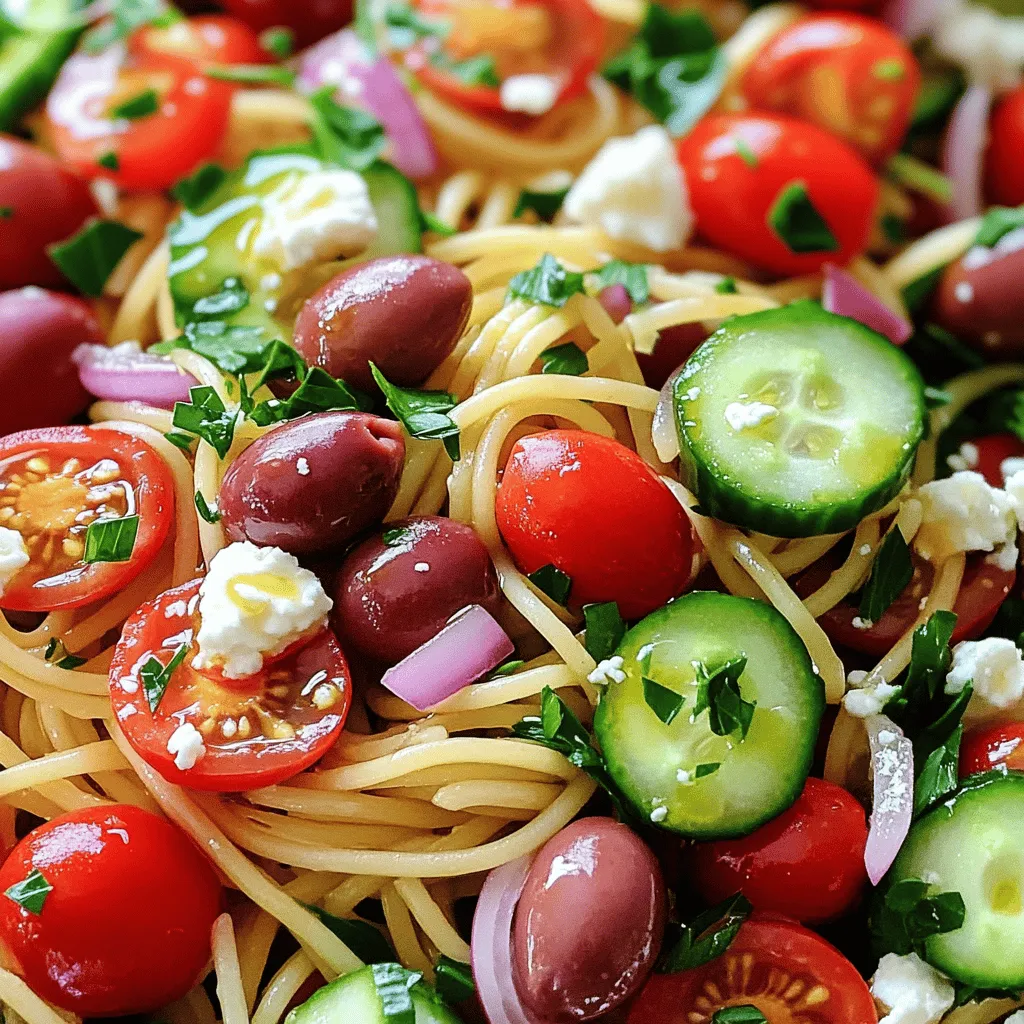
Variations
Vegetarian and Vegan Options
For a vegetarian option, you can replace feta cheese with a dairy-free alternative, like cashew cheese or tofu. This keeps the dish creamy without using dairy. If you want to make it vegan, simply skip any cheese and add more veggies or nuts. Adding chickpeas or black beans can also bring in extra protein. They add a nice texture and taste.
Gluten-Free Adaptations
If you need a gluten-free option, swap regular spaghetti for gluten-free pasta. There are many great types made from rice or quinoa. They taste good and hold up well in salads. When making a dressing, check the labels for gluten. Some vinegars may contain traces. Stick to pure olive oil and vinegar for safety.
Flavor Profile Variations
You can change the flavor by trying different dressings. A tangy balsamic vinaigrette or a creamy tahini dressing can give a new twist. Adding unique vegetables like bell peppers or artichokes can also change the taste. For a protein boost, try grilled chicken or shrimp. These additions can make your spaghetti salad even more exciting.
Storage Info
Best Storage Practices
To keep your spaghetti salad fresh, store it in the fridge. Use an airtight container. This helps to keep the flavors intact and prevents drying out. Glass or plastic containers work well for this. Always cool the salad completely before sealing it.
Shelf Life
How long does the salad last? When stored properly, it can last about 3 to 5 days. Always check for signs that the salad has gone bad. If you see mold or a sour smell, it’s time to toss it.
Reheating Tips
When you want to enjoy leftovers, serve the salad cold. If you prefer it warm, gently reheat it on low heat. Avoid high heat, as it can make the pasta mushy. Always be cautious when reheating with ingredients like feta. They can change texture and flavor.
Try the full recipe for Mediterranean Spaghetti Salad for a refreshing summer dish!
FAQs
Can I make Spaghetti Salad ahead of time?
Yes, you can make Spaghetti Salad ahead of time. It tastes even better after sitting. To prepare in advance, follow these tips:
– Cook the spaghetti and let it cool completely.
– Mix all ingredients except the dressing.
– Store it in the fridge for up to 24 hours.
– Add the dressing just before serving to keep it fresh.
What types of dressing are best for Spaghetti Salad?
You have many choices for dressing your Spaghetti Salad. Here are some suggestions:
– Use extra virgin olive oil for a rich flavor.
– Red wine vinegar adds a nice tang.
– Try apple cider vinegar for a sweeter taste.
– You can also blend in fresh herbs for more flavor.
How to make Spaghetti Salad more filling?
To make your Spaghetti Salad more filling, consider these ideas:
– Add proteins like grilled chicken or shrimp.
– Toss in beans like chickpeas or black beans.
– Include whole grains like quinoa for added texture.
– Nuts or seeds can give a nice crunch and extra nutrients.
Is Spaghetti Salad gluten-free?
Yes, you can make Spaghetti Salad gluten-free. Use gluten-free pasta made from rice or corn. This way, everyone can enjoy it. Be sure to check the labels for gluten in other ingredients like dressings.
Spaghetti salad is simple to make and full of fresh flavors. You learned the key ingredients, from spaghetti noodles to bright vegetables and tangy feta. I shared tips to avoid common mistakes and enhance flavors. You can also explore variations that fit your diet, like vegan or gluten-free options.
Lastly, remember to store it properly for lasting joy. Enjoy this versatile dish at your next meal or gathering. Trust me, it will impress everyone!

